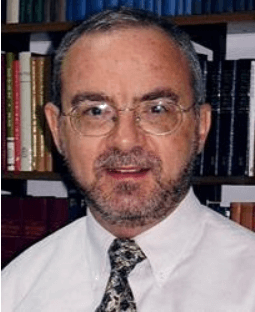
NEW HAVEN — Dr. Baruch J. Schwartz, native of Philadelphia and long-timeresident of Efrat, Israel, is spending the academic year at Yale University as the Jacob Perlow Visiting Associate Professor in Judaic Studies. In the fall semester, Schwartz taught a seminar entitled “Worship in Ancient Israel;” in the spring semester, he taught a course on the Biblical book of Ezekiel.
Schwartz is the A.M. Shlansky Senior Lecturer in Biblical History at the Hebrew University in Jerusalem. He has lectured extensively throughout the world, serving as visiting professor at such institutions as Tel Aviv University, the Schechter Institute, Ben Gurion University, the University of Sydney, Australia, St. Paul Seminary in St. Paul, Minnesota, the University of California at Davis, and Harvard Divinity School.
Recently, the Ledger spoke with Schwartz about his work as a Biblical scholar and at Yale.
Q: What is the “job” of a Biblical scholar? How does a Biblical scholar approach the Bible?
A: Biblical scholarship is the academic study of Biblical literature in its original meaning, context and form. Scholars study the ancient world, including language, literature, concepts and religion. This method of studying the Bible can be seen as an outgrowth of the method used by such great medieval commentators as Samuel ben Meir (Rashi’s grandson) and other members of the “peshat-school” in the twelfth century. What is different is that we have more and better tools than they had. For example, we have real knowledge of the history of the period and of the ancient Semitic languages, and we have a more developed sense of how the solution to some of the tough problems of interpretation may actually be in the history of the text: its transmission, its composition, or both. The medieval commentators seldom dreamed of these possibilities.
Q: Is this approach to the Bible ever at odds with your belief and practice as an Orthodox Jew?
A: Personally, I have arrived at the conclusion that there is no contradiction whatsoever between fidelity to the critical method of studying the Bible and commitment to Jewish belief and practice. But to go into this in detail here would be impossible. I have actually taught a whole course on this issue; it is complex and fascinating. One thing to keep in mind is that the critical method was actually discovered and developed, for the most part, by pious, believing people, who simply wanted to study the Biblical text on its own terms and in its own context. They didn’t at all come from an antagonistic motivation, but rather from a pious one.
Q: What are your main areas of academic interest?
A: I am interested in the Biblical book of Leviticus, especially in the literary, ritual and legal aspects of the book – and in the rest of what scholars refer to as the “Priestly” writings. I am also interested in the composition of the Torah, namely, the question of how it was put together from its component parts. Two of my sidelines are the book of Ezekiel, which I am teaching this semester at Yale, and certain aspects of medieval commentaries.
Q: In what ways are students at American universities similar to and different from your students in Israel?
A: Students in Israel are always older, busier, and more pressured. They have to do army reserve duty; they often have to work; and they experience financial pressures. American students tend to have more time, more funding and better study habits, but in Jewish Studies, Israelis have it over the Americans because they have the language skills and the text ‘talks’ to them. They have more fluency with the material as they have been studying it their whole lives. Both students can be incisive and critical, which is a good thing.
Q: How have you spent your year in New Haven?
A: I taught two courses at Yale and delivered several lectures there. I regularly attend the Westville Synagogue, and I delivered a lecture there as part of the Westville University adult education series. I have also served as scholar in residence at several synagogues and Jewish institutions around the country. But most of my time has been devoted to teaching, lecturing and research.
Q: Is your family here with you? What do they do in Israel?
A: They are not. Fortunately, however, I was home in Israel for two weeks in December during intercession, and they are joining me here for Pesach. My younger son, Shlomo, is in the IDF (Israel Defense Forces), serving in the Givati Brigade special forces; he was involved in the fighting in Gaza during my visit home this winter. My wife Sema works in the office of a tax accountant; my older son, Moki, is a tour guide and student at the Hebrew University; his wife Rachel Dweck teaches in a school near Jerusalem, and my daughter, (also) Rachel, is an aspiring documentary film editor in Jerusalem.
